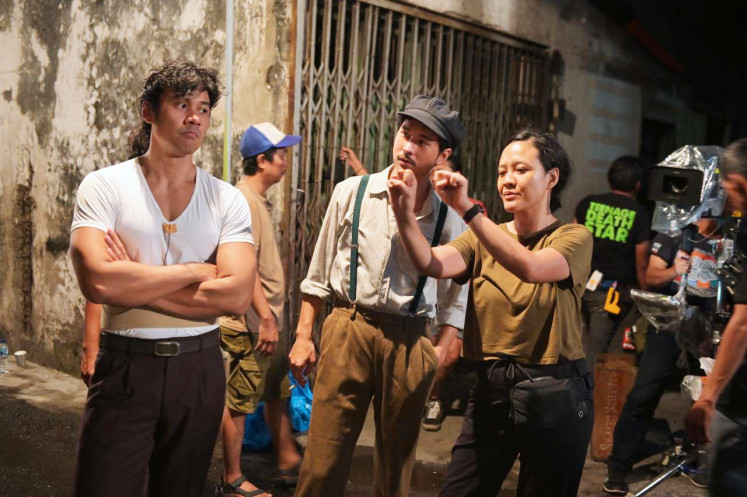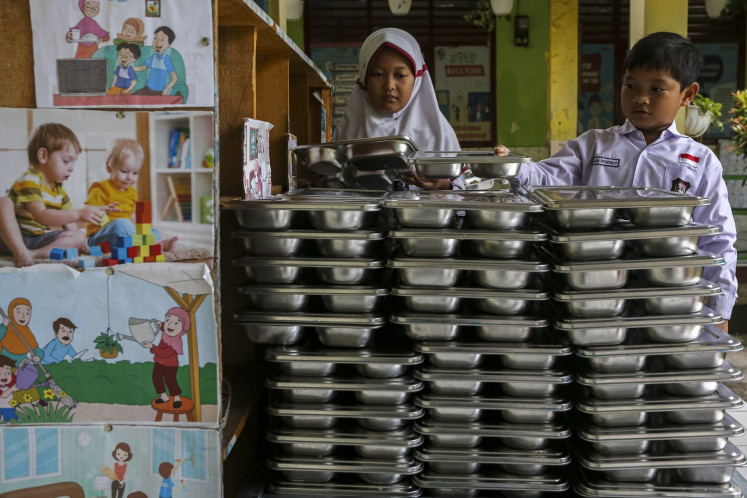Philanthropic Tanoto family fights to tackle stunting and education problems
Change text size
Gift Premium Articles
to Anyone
 Social visit: Belinda Tanoto visits Rumah Anak Sigap, a parenting and early-learning center for children, from infants to age 3, in Kebon Jeruk, West Jakarta. (Courtesy of Tanoto Foundation) (Courtesy of Tanoto Foundation/Courtesy of Tanoto Foundation)
Social visit: Belinda Tanoto visits Rumah Anak Sigap, a parenting and early-learning center for children, from infants to age 3, in Kebon Jeruk, West Jakarta. (Courtesy of Tanoto Foundation) (Courtesy of Tanoto Foundation/Courtesy of Tanoto Foundation)
P
roviding scholarships, enhancing school facilities and partnering with international organizations -- the Tanoto Foundation aims to overcome the country’s social issues.
The nine-floor Tanoto Foundation building is located on Jl. Teluk Betung 33, Central Jakarta, just across from the Grand Indonesia shopping mall. Founded by Sukanto Tanoto and his wife Tinah Bingei, the foundation focuses on supporting human development through early childhood education and development of basic education, leadership and medical research.
“Philanthropy is relatively new in Indonesia but the progress is quite encouraging,” said daughter Belinda Tanoto, a finance and political science graduate from the Wharton School of the University of Pennsylvania and an MBA from the Harvard Business School, the United States.
The foundation is totally independent and legally separated from the family-business empire, so the building is used only for foundation activities. The family-business headquarters is on the right side of the foundation office.
In a recent interview with The Jakarta Post, Belinda recognized the serious problems in the education and health sector that Indonesia endures.
The two issues motivated her parents to set up the Tanoto Foundation 41 years ago. Back then, Sukanto and Tinah built a kindergarten and an elementary school in Besitang, Langkat regency, on the border of North Sumatra and Aceh province.
The foundation was established based on the couple’s own experience in operating their timber businesses in remote areas. At that time, they had two education facilities for the children of their company workers and the inhabitants of the nearby plywood factory.
Sukanto is also the founder and chairman of the Singapore-based Royal Golden Eagle (RGE). The group now manages a group of resource-based manufacturing companies with assets of more than US$20 billion and hires over 60,000 employees in Indonesia, China, Singapore and Brazil.
In many corners of the world, resource-based corporations are targets of criticism from environmentalists, and they are regularly blamed as the sources of environmental damage and many other issues. But this report focuses on philanthropy and does not take a certain position on the controversy.
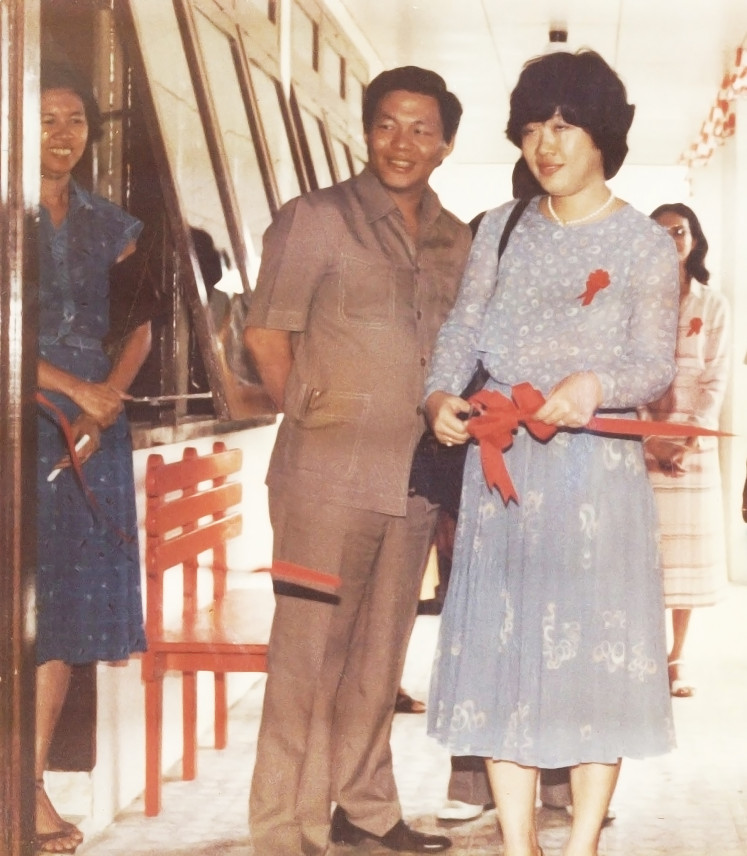
Far behind
A highly respected international institution on education ranked Indonesia nearly at the very bottom of its list. The United Nations Children’s Fund (UNICEF) has also recently warned Indonesia over the latent threat of severe stunting among Indonesian children.
Indonesia’s education level remains far behind that of many other countries. In 2018, the Program for International Student Assessment (PISA) conducted its every-three-year assessment survey to measure 15-year-old students’ literacy in reading, mathematics and science. The survey was organized by the Organization for Economic Co-operation and Development (OECD).
Indonesia was ranked 74th of 80 participating countries, with the same rank in reading, the 73rd in mathematics and the 71st in science. It seems there was no survey in 2021 due to the COVID-19 pandemic.
In the meantime, UNICEF warned in July that severe wasting -- the most dangerous form of malnutrition -- continues to be a major public-health issue in Indonesia, affecting more than 2 million children under 5 years old.
“The condition increases the risk of childhood mortality by approximately 12 times and requires urgent treatment,” the UN organization cautioned the government last month.
Thanks to the steady increase in commodities such as palm and coal, the government was able to allocate an addition of Rp 78.5 trillion (US$5,250,825) for the education sector for this year’s fiscal year. With a Rp 621.3 trillion budget, the government has met the mandatory spending of at least 20 percent of the state budget for education.
“The government has been able to allocate 20 percent of the state budget for education. It is a gigantic amount. But we should remember that the government will not be able to develop education alone,” Belinda said.
In the health sector, the government has also allocated Rp 256 trillion, or 9.4 percent of the total state budget, but much of the money still has to be used to fight the COVID-19 pandemic. The stunting problem, however, is also a top priority.
In his speech to celebrate National Family Day on July 7, President Joko “Jokowi” Widodo expressed his determination to reduce the pervasiveness of stunting from the current 24.4 percent to 14 percent in 2024 when he ended his second five-year term.
“One in four Indonesian children is stunted,” Belinda noted.
“The brains of stunted children do not develop properly and the cognitive impairment is visible in brain scans. It is no surprise that stunted children suffer from learning disabilities and are more likely to drop out of school,” said Belinda.
Indonesia thus calls for more awareness and readiness from the rich, conglomerate and prosperous private corporations to be more progressive in their philanthropic activities. Many big companies are encouraged to spare some portion of their profit for mandatory corporate social responsibility (CSR).
Sukanto is one of the conglomerates that came forward to participate in philanthropy with long-term and well-planned programs, especially in the education and health sectors.
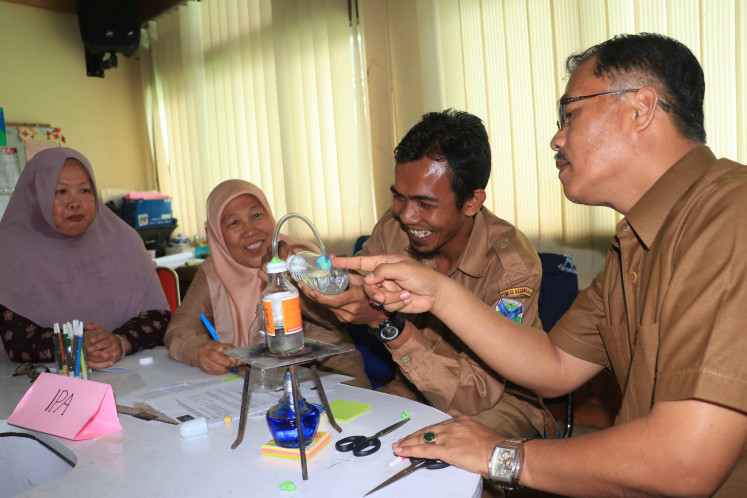
Education is number one
According to Belinda, her father’s focus on education is due to his own background of not completing his senior high school years in the 1960s. As the eldest son, he had to help out with his parents’ business. But her father was determined to take management courses in INSEAD in France and at Harvard and Wharton.
“Although my father did not have the opportunity to complete his formal education, he is a lifelong learner and a passionate proponent of education. Even today, he still reads books or watches pre-recorded management courses before going to bed late at night,” Belinda praised her father.
On its official website, the foundation claims that it has provided at least 20,000 scholarships and constructed schools and education facilities that have produced 27,000 graduates. They have also developed 60,000 hectares of Community Livelihood Plantations and created more than 1,800 jobs in local communities through small-to-medium-sized enterprise (SME) programs.
Since 2006, the foundation has provided generous scholarships for more than 8100 students, not just for their tuition fees and living costs but also to finance their research and studies at top universities abroad. Some students also obtain internship opportunities at the family business. All scholarships are unconditional.
Belinda noted that although her family’s contribution is small compared to the state funding, she believes it will remain meaningful for the development of Indonesia. The family has proved it with its concrete achievements.
The family often collaborates with other local charity organizations, such as Djarum Foundation and international philanthropies such as Bill & Melinda Foundation. They have also worked with international organizations such as the World Bank and UNICEF. The family also works closely with several related ministries and the central and regional governments.
Tanoto Foundation has now become an international philanthropic organization with its main activities in 15 provinces in Indonesia and nine provinces in China, as well as in Beijing and Singapore.
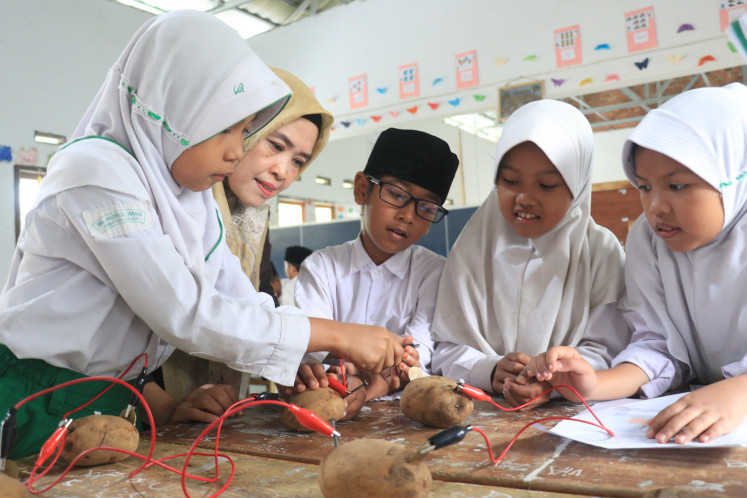
Unstoppable
As the founders of the foundation, Sukanto and Tinah have practically entrusted their children -- Andre, Imelda, Belinda and Anderson -- to fully oversee the foundation activities as members of the board of trustees.
Their eldest son, however, is not active in managing the family’s RGE group. He has his own food-and-beverage industry. Like Belinda, Imelda and Anderson also graduated from Wharton School of the University of Pennsylvania.
Sukanto’s family continues increasing their funds for the foundation activities. According to its 2021 annual report, the foundation spent US$25.1 million, including $9.2 million for learning environments, $5 million for future leaders and $1.1 million for medical research and science. It was a sharp increase compared to the 2020 budget of $20.9 million.
In 2021, the foundation’s Program Pintar cooperated directly with 840 schools and 13 teachers’ training institutions; altogether, about 52,000 students and 23,000 teacher candidates were impacted by the program. It was focused on literacy, math and science.
Meanwhile, in a collaboration with its partner, training was conducted in 25 regencies and cities in seven provinces, including North Sumatra, Riau, Jambi, Central Java, West Java and East Kalimantan. It involved 784 schools, 916 teacher facilities, 8,490 educators, 1,139 lecturers, 9,367 teacher candidates and nearly 200,000 students.
Supporting the government’s stunting-eradication program, the Tanoto Foundation helps to upgrade the existing infrastructure, training models and systems to help 600,000 families and 39,000 social workers to upgrade their knowledge and skill in their treatment of stunting programs.
Sukanto and his family have done their part to complement the government on health and education. Many companies and wealthy families have also given their contributions in their own ways. Indonesia needs more help from its fortunate sons and daughters to tackle these social issues.




